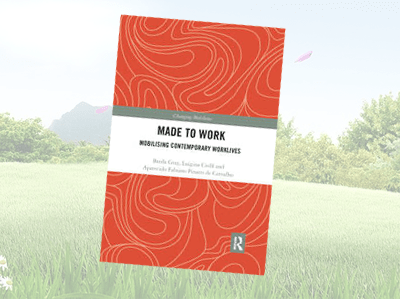Summer can be a time for long reads, so here are a few suggestions from three members of the Steering Committee to keep you busy. If you want to share reading ideas – log on to the EUSSET social hub and add your reading suggestions to the community building space. And it is perfectly fine to hilight your own work 🙂
Architect or Bee – the human price of technology
Myriam Lewkowicz:
– I start with a book that I think is terrific, which is “Architect or Bee – the human price of technology”, from Mike Cooley (published first in 1980).

Mark Cooley was an engineer, an academic, a trade unionist, and a socialist. I was introduced to this book (and more generally to Mike’s work) by Liam Bannon, and it was mentionned by Finn Kensing during ECSCW in Coimbra last week, and it reminded how much I love it and how it is (from my point of view) close to EUSSET, as it definitely addresses socially-embedded technologies, and that I want to introduce this book to younger researchers.
I think this book is worth reading for anyone interested in all the discourses around “the future of work”, and it contains the wonderful example of the Lucas workers’ plan (https://en.wikipedia.org/wiki/The_Lucas_Plan or https://www.socialistparty.org.uk/articles/13301/07-12-2011/when-workers-planned-production-the-lucas-aerospace-plan/), reflecting after 10 years of the plan.

Made to Work
Luigina Ciolfi:
– I will shamelessly self-promote and suggest one of our books, “Made to Work” (2020) by Breda Gray, Luigina Ciolfi and Aparecido Fabiano Pinatti de Carvalho
Made to Work analyses the conditions of mobile knowledge work (MKW) in contemporary worklives, contrasting and drawing parallels among three highly significant sectors of the Knowledge Economy: academia, information communication technology (ICT) management, and digital creative work.
Its insights open up a conversation about the complex ways in which contemporary worklives are ‘made to work’ in relation to time, place, productivity and identity, and about potential interventions to bring about more just worklife conditions in the future as we approach an attempt to support “hybrid” work in the wake of the Covid-19 pandemic.
Future-proofing
Claudia Müller
– I would like to contribute with our recently published book, Future-proofing: Making Practice-Based IT Design Sustainable (2022) by Carla Simone, Ina Wagner, Claudia Müller, Anne Weibert, and Volker Wulf.

Sustainability is crucial for the future of our societies. From a computing perspective, the challenge is to design IT artifacts that contribute to improving people’s work and everyday lives in a sustainable way, thereby also contributing to social and ecological sustainability. The book documents the experiences of several leading research groups in Europe, North America, and South Africa, describing their efforts to achieve sustainable design results, the difficulties that barred the way, and the strategies they adopted to achieve the goal of sustainability.
The analysis of this rich empirical material aids consideration of how to more systematically address and possibly overcome impediments to achieve a design result that is sustainable in practice. It points to the importance of considering the socio-technical nature of innovation, focusing on the relationship between ownership, appropriation, and learning early on in a project, and not only striving for technological flexibility but also taking care of issues of maintenance repair in designing computer support.
The book discusses the changes that would be necessary to make the main stakeholders in IT design more open to creating environments for sustainable innovation. The examples discussed in this book and their analysis can inspire researchers, institutions, managers, IT professionals, and educators to promote the goal of sustainable design and increase the overall awareness of its strategic relevance.
Discuss and add your reading suggestions to the community building space 🙂
